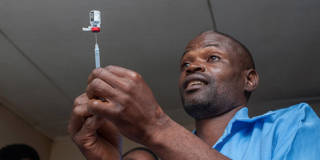When vaccines for COVID-19 became available, governments’ highest priority was to get them approved as quickly as possible, in order to save millions of lives. Regulatory authorization of a new, low-cost malaria vaccine, recommended by the World Health Organization in October, deserves to be treated with the same degree of urgency.
PRINCETON – In 2021, malaria caused 619,000 deaths, 77% of which were children under five, and 96% of them in Africa. But now, after decades of research – and several false dawns – a malaria vaccine known as R21/Matrix-M (henceforth just R21) has been shown to be effective in 70-78% of cases. Although three doses are required before that level of protection is reached, and a booster is needed one year later, the vaccine, developed at the University of Oxford and the Serum Institute of India, is cheap. It can be produced for $2-$4 per dose – comparable to the cost of other childhood vaccines.
Adding costs for delivery and administration, we can say that R21 costs approximately $5 per dose. A recent study indicates that fully vaccinating eligible children in areas where malaria is prevalent would save more than 600 lives per 100,000 children vaccinated, as well as prevent nearly 200,000 clinical cases of malaria (because once someone gets malaria, it is likely to recur). This suggests that the deaths of hundreds of thousands of children could be prevented for roughly $3,300 per life saved.
In October, R21 was recommended by the World Health Organization. It now needs to go through the WHO’s prequalification process and receive the recommendation of the WHO’s Strategic Advisory Group of Experts on Immunization. Then a broad international rollout can begin.

PRINCETON – In 2021, malaria caused 619,000 deaths, 77% of which were children under five, and 96% of them in Africa. But now, after decades of research – and several false dawns – a malaria vaccine known as R21/Matrix-M (henceforth just R21) has been shown to be effective in 70-78% of cases. Although three doses are required before that level of protection is reached, and a booster is needed one year later, the vaccine, developed at the University of Oxford and the Serum Institute of India, is cheap. It can be produced for $2-$4 per dose – comparable to the cost of other childhood vaccines.
Adding costs for delivery and administration, we can say that R21 costs approximately $5 per dose. A recent study indicates that fully vaccinating eligible children in areas where malaria is prevalent would save more than 600 lives per 100,000 children vaccinated, as well as prevent nearly 200,000 clinical cases of malaria (because once someone gets malaria, it is likely to recur). This suggests that the deaths of hundreds of thousands of children could be prevented for roughly $3,300 per life saved.
In October, R21 was recommended by the World Health Organization. It now needs to go through the WHO’s prequalification process and receive the recommendation of the WHO’s Strategic Advisory Group of Experts on Immunization. Then a broad international rollout can begin.